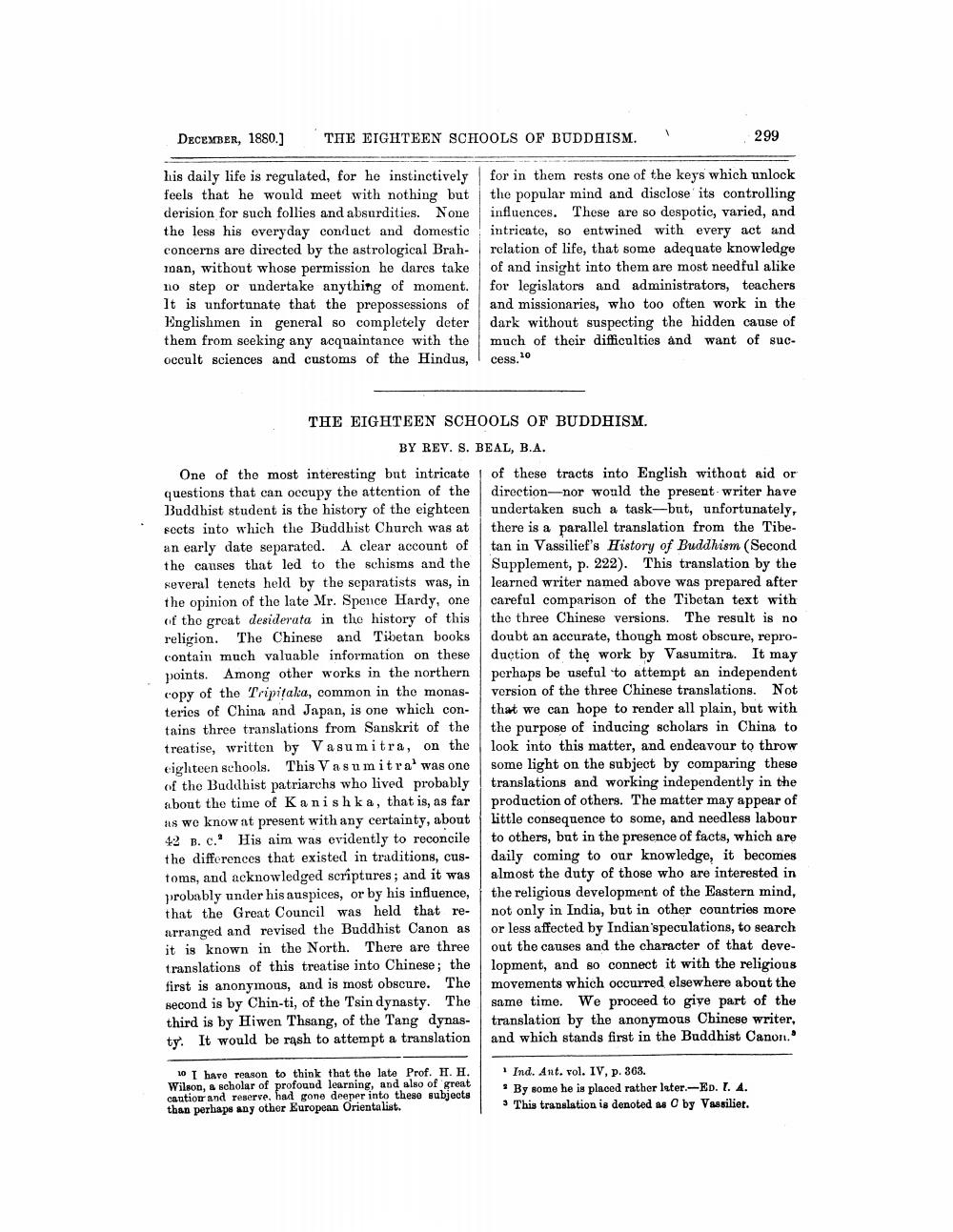________________
DECEMBER, 1880.]
THE EIGHTEEN SCHOOLS OF BUDDHISM.
299
his daily life is regulated, for he instinctively feels that he would meet with nothing but derision for such follies and absurdities. None the less his overyday conduct and domestic concerns are directed by the astrological Brahwan, without whose permission ho dares take no step or undertake anything of moment. It is unfortunate that the prepossessions of Englishmen in general so completely deter them from seeking any acquaintance with the occult sciences and customs of the Hindus,
for in them rests one of the keys which unlock the popular mind and disclose its controlling influences. These are so despotic, varied, and intricate, so entwined with every act and relation of life, that some adequate knowledge of and insight into them are most needful alike for legislators and administrators, teachers and missionaries, who too often work in the dark without suspecting the hidden cause of much of their difficulties and want of success.
THE EIGHTEEN SCHOOLS OF BUDDHISM.
BY REV. S. BEAL, B.A.
One of the most interesting but intricate questions that can occupy the attention of the Buddhist student is the history of the eighteen sects into which the Buddhist Church was at an early date separated. A clear account of the causes that led to the schisms and the several tenets held by the separatists was, in the opinion of the late Mr. Spence Hardy, one of the great desiderata in the history of this religion. The Chinese and Tibetan books contain much valuable information on these points. Among other works in the northern copy of the Tripitaka, common in the monasteries of China and Japan, is one which contains three translations from Sanskrit of the treatise, written by Vasu mitra, on the eighteen schools. This Vasumitra was one of the Buddhist patriarchs who lived probably about the time of Kanishka, that is, as far as we know at present with any certainty, about 42 B. c. His aim was evidently to reconcile the differences that existed in traditions, customs, and acknowledged scriptures, and it was probably under his auspices, or by his influence, that the Great Council was held that re- arranged and revised the Buddhist Canon as it is known in the North. There are three translations of this treatise into Chinese; the first is anonymous, and is most obscure. The second is by Chin-ti, of the Tsin dynasty. The third is by Hiwen Thsang, of the Tang dynas- ty. It would be rash to attempt a translation
of these tracts into English without aid or direction-nor would the present writer have undertaken such a task-but, unfortunately, there is a parallel translation from the Tibetan in Vassilief's History of Buddhism (Second Supplement, p. 222). This translation by the learned writer named above was prepared after careful comparison of the Tibetan text with the three Chinese versions. The result is no doubt an accurate, though most obscure, reproduction of the work by Vasumitra. It may perhaps be useful to attempt an independent version of the three Chinese translations. Not that we can hope to render all plain, but with the purpose of inducing scholars in China to look into this matter, and endeavour to throw some light on the subject by comparing these translations and working independently in the production of others. The matter may appear of little consequence to some, and needless labour to others, but in the presence of facts, which are daily coming to our knowledge, it becomes almost the duty of those who are interested in the religious development of the Eastern mind, not only in India, but in other countries more or less affected by Indian'speculations, to search out the causes and the character of that development, and so connect it with the religious movements which occurred elsewhere about the some time. We proceed to give part of the translation by the anonymous Chinese writer, and which stands first in the Buddhist Canon."
10 I have reason to think that the late Prof. H. H. Wilson, & scholar of profound learning, and also of great cautiour and reserve, had gone deeper into these subjects than perhaps any other European Orientalist.
Ind. Ant. vol. IV, p. 368. * By some he is placed rather later.-ED. . A.
This translation is denoted as O by Vassilier.




